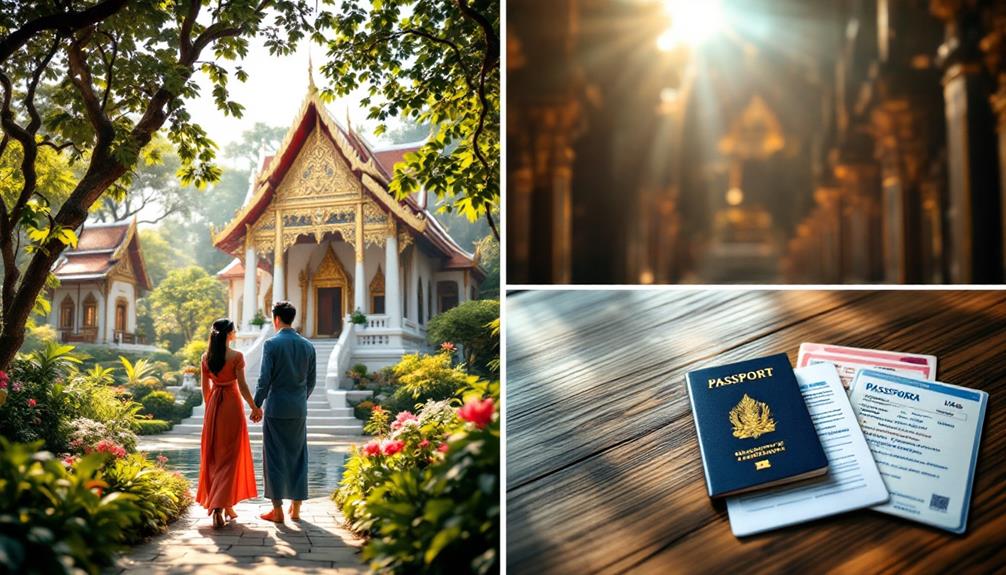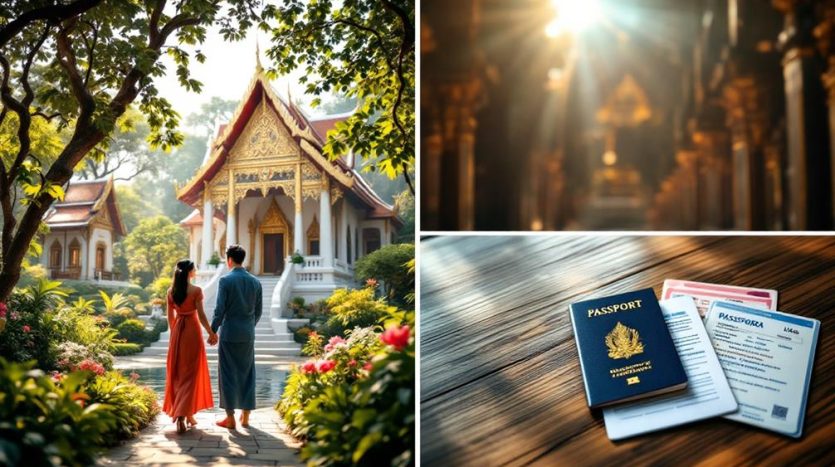Can a US Citizen Live Permanently in Thailand?
Imagine waking up each day to the vibrant culture and stunning landscapes of Thailand, a dream that's more attainable than you might think. As a US citizen, you can reside there permanently by maneuvering the visa landscape wisely. Whether you're considering retirement, business opportunities, or even marriage, Thailand has a range of options. However, it's not just about securing a visa; you must also navigate financial requirements and legal obligations. Are you ready to explore what it truly takes to make Thailand your forever home? Discover the essential steps and factors involved.
Key Takeaways
- US citizens can live permanently in Thailand by obtaining a retirement visa, available for individuals aged 50 or older with financial proof.
- Permanent residency requires holding a valid visa for three consecutive years and showing financial stability and long-term commitment.
- A Non-Immigrant "B" Visa and work permit are necessary for US citizens starting businesses or working in Thailand.
- Marriage to a Thai citizen allows eligibility for a marriage visa if financial proof and documentation requirements are met.
- Education opportunities in Thailand are accessible through a Non-Immigrant ED Visa with proof of acceptance from a recognized institution.
Understanding Thai Visa Options

When evaluating a move to Thailand, it's crucial to understand the various visa options available to you as a U.S. citizen. Maneuvering Thailand's immigration laws can feel like deciphering ancient scrolls, but fear not, you're about to become a visa virtuoso.
First, there's the trusty tourist visa, perfect for short-term escapades. This visa allows you to frolic in Thailand for up to 60 days, with the possibility of visa extensions to squeeze in an extra month of pad thai and beaches.
If you're planning a longer stay, it's vital to recognize that a valid Non-Immigrant Visa is required for long-term rentals, ensuring compliance with local laws.
Suppose your heart's set on a retirement lifestyle. In that case, you'll need to evaluate visa sponsorship options, but let's not get ahead of ourselves.
For long-term travel enthusiasts who want more than a tourist's whirlwind romance, the non-immigrant visa might be your match. It offers a variety of categories, from business to education, depending on your needs.
Retirement Visa Requirements
Now that you've got a grasp on the general visa landscape, it's time to focus on the specifics of obtaining a retirement visa in Thailand.
First, make certain you meet the golden age requirement—50 years young or older. Because, let's face it, if you're younger, you're still in the working class struggle.
Next, financial planning is essential. You must either have a monthly income of at least 65,000 baht or a bank account with 800,000 baht. Think of it as a combination of financial stability and making sure you can afford more than just pad thai during your golden years.
Additionally, be aware that regional cost variations exist, with urban areas being pricier than rural ones, which can impact your budget management.
You'll also need a clean criminal record. Thailand likes its retirees squeaky clean—no past life of crime, please.
Once you've ticked those boxes, don't forget healthcare options. You need proof of health insurance, because nobody wants to get caught with a nasty case of the flu and no coverage.
Business Visa Opportunities

Maneuvering the intricate landscape of business visa opportunities in Thailand requires a keen understanding of current regulations and precise documentation. It's no walk in the park, so tighten your seatbelt, and let's plunge into the labyrinth.
To initiate entrepreneurial ventures in the Land of Smiles, you'll need a Non-Immigrant "B" Visa. This isn't a golden ticket, but it's your key to access investment opportunities. The visa is tailored for those looking to work, conduct business, or even start their own company in Thailand. Given the complexities, it's advisable to seek legal expertise to guarantee compliance with Thai regulations, which can help avoid potential pitfalls related to foreign ownership and visa procedures.
Now, don't just wave your passport and expect a red carpet. You'll need a letter of approval from the Ministry of Labour, proof of financial stability, and, of course, a company profile. It's like an exclusive club, and you're the latest VIP member.
But wait, there's more! Once you've secured your Non-Immigrant "B" Visa, you can apply for a work permit. It's your backstage pass to legally operate in Thailand.
Education and Student Visas
When considering an educational opportunity in Thailand, you'll need to secure a Non-Immigrant ED visa, commonly known as a student visa. This visa requires a letter of acceptance from a recognized Thai educational institution and proof of financial means to support your stay.
It's crucial to understand that the cost of living in urban areas like Bangkok can be considerably higher than in rural areas, which may impact your budget during your studies.
Be aware that maintaining your student status involves adhering to specific reporting requirements and regulations set by Thai immigration authorities.
Obtaining a Student Visa
To obtain a student visa for Thailand, you must first secure admission to a recognized educational institution within the country. Think of it as your golden ticket into a domain of language barriers and cultural immersion—because let's face it, who doesn't want to struggle ordering pad thai in Thai?
Once accepted, the institution provides you with an acceptance letter and requisite documentation, which you'll need to present to the Thai embassy or consulate in the U.S.
Now, don't get too cozy just yet. You'll be required to fill out the Non-Immigrant Visa "ED" application form—think of it as a bureaucratic scavenger hunt! Be sure to gather all the supporting documents, like your passport (valid for at least six months), proof of financial means, and a recent passport photo.
Once you've submitted everything, it's a waiting game. If approved, congratulations! You've accessed the next level in your quest for knowledge and spicy street foods.
But remember, this visa requires regular reporting to immigration authorities and a commitment to your studies. So, prepare to embrace the complexities of Thai grammar and the art of bargaining at local markets. Happy studying!
Educational Opportunities Available
Securing a student visa is just the start of your educational adventure in Thailand. Now, let's plunge into the sea of opportunities waiting for you.
Imagine this: you, mastering Thai in a language learning course, impressing locals with your flawless pronunciation, and, dare I say, even cracking a joke or two in Thai!
Universities like Chulalongkorn and Mahidol offer programs specifically designed for international students, blending rigorous academics with cultural exchange. You'll engage with classmates from every corner of the globe—think of it as an educational potluck, but instead of food, you're sharing perspectives.
You might be wondering, "Can I study anything besides Thai?" Absolutely! Immerse yourself in fields like business, engineering, or even the fine arts.
And the beauty of it? You'll gain insights from a unique cultural standpoint. Thai universities cherish cultural exchange, so expect a curriculum that's as diverse as Bangkok's street food scene.
Marriage Visa Process

Steering through the marriage visa process for Thailand demands attention to detail and thorough preparation.
You'll navigate a sea of paperwork, but don't let that scare you—consider it an adventure in bureaucracy! First, arm yourself with visa application tips like confirming your U.S. passport isn't nearing its expiration date. Believe me, no one likes surprises, least of all immigration officers.
Next, plunge into marriage documentation requirements. Verify your marriage certificate is legit and notarized. No, the one you got from Elvis in Vegas won't cut it. Translate it into Thai and get it certified by the Thai Ministry of Foreign Affairs.
You'll also need proof of financial means, such as bank statements showing a balance of 400,000 THB or a monthly income of 40,000 THB. Yes, your piggy bank needs to be plump!
Other essential documents include a visa application form TM86 or TM87 and your spouse's Thai ID. Double-check everything twice, then check again—trust me, you don't want to be sent back to the starting line.
With these detailed steps, you'll be well-prepared to make Thailand your forever home, or at least until the paperwork needs renewing.
Permanent Residency Criteria
To obtain permanent residency in Thailand, you first need to meet specific eligibility requirements, such as holding a non-immigrant visa for at least three consecutive years.
Once eligible, you'll follow a structured application process, including submitting detailed documentation like proof of income and a Thai police clearance certificate.
Ascertain all paperwork complies with the legal standards to increase your chances of approval.
Eligibility Requirements Overview
Understanding the eligibility requirements for permanent residency in Thailand is essential if you're considering making this vibrant country your long-term home. Let's explore the nitty-gritty, shall we? First up, you'll need to navigate visa sponsorship options. Are you the entrepreneurial type, the job-hopping expat, or perhaps a retiree? Each category wields its own magical key to permanent residency.
Next, let's talk about the eligibility assessment criteria. Think of it as a checklist with a sense of humor: age, health, financial stability, character, and Thai language proficiency. Yes, that last one means you'll finally have to master the art of ordering more than just pad thai.
Here's a quick glance at the essentials:
| Criteria | Description | Quirk Level |
|---|---|---|
| Age | Must be 50+ for retirement visas | Charming |
| Health | Fit as a fiddle | Unavoidable |
| Financial Stability | Show me the money! | Bank Statement |
| Language Proficiency | Thai "Sawasdee" mastery | Tongue-twister |
Application Process Steps
Initiating the journey to obtain permanent residency in Thailand involves a structured application process that demands meticulous attention to detail.
First things first, you'll want to befriend the calendar because timing is everything. The application timeline is as strict as a Thai street vendor when it comes to bargaining. You'll need to apply between October and December, so mark your planner and set those reminders.
Next, let's talk money. Visa fees can be a shocker, akin to finding out your favorite street food stall ran out of mango sticky rice. Prepare to shell out around 7,600 to 191,400 Thai Baht, depending on your category and nationality. Think of it as an investment in your future Thai adventures.
Now, here's where things get interesting. Pay close attention to the application form—it's as detailed as a Sherlock Holmes novel. Filling it out incorrectly might send you back to step one faster than you can say "Pad Thai."
While you're at it, make sure your application photos capture your best side. After all, who wouldn't want their future neighbors to see them at their most photogenic? With patience and precision, you'll be sipping Thai iced tea as a permanent resident in no time!
Required Documentation Details
Maneuvering Thailand's permanent residency criteria requires a keen eye for detail and a well-organized approach, as the required documentation is as extensive as a legal case file.
Imagine you're a detective unraveling a mystery, except you're not solving a crime—you're solving the enigma of Thai bureaucracy. To succeed, start with your visa application, the cornerstone of your residency quest. Make certain you've got your passport, which should be valid and not looking like it's survived a tropical monsoon.
Next, gather your personal documents, including birth certificates and marriage licenses. The Thai officials will want your life's story in triplicate, so make sure each document is notarized, certified, and ready to impress.
Don't forget your police clearance certificate, because they want to know you're not an international man of mystery with a penchant for mischief.
Financial proof is also key. You'll need bank statements that don't resemble a college student's wallet after spring break. If you're employed, letters from your employer detailing your position and salary are essential.
Navigating Work Permits

Obtaining a work permit is a critical step if you plan to live and work in Thailand as a U.S. citizen. Without it, you might as well be trying to ride an elephant without a saddle—awkward and likely to end in disaster.
First, familiarize yourself with the work permit types available, like the standard work permit or the BOI-promoted one. Each type has its quirks, much like a Thai street market.
Now, don't expect to waltz into the application process without breaking a sweat. You'll need a job offer first, as Thailand frowns upon freelancing without paperwork.
Here's what you'll need:
- A valid non-immigrant visa: Think of it as your golden ticket to the work permit application.
- Proof of employment: Your employer should provide this, or they're as useful as a tuk-tuk with no driver.
- Educational certificates: Dust off those diplomas—they're key!
- Health certificate: No one wants a sickly expat, right?
Cost of Living in Thailand
When considering relocating to Thailand, you must evaluate key cost components such as housing and rental prices, food and dining expenses, and transportation and utilities costs.
You'll find that rental rates vary greatly based on location, with cities like Bangkok commanding higher prices.
Additionally, while dining out can be economical, it's essential to budget for fluctuating utility costs, especially during peak seasons.
Housing and Rental Prices
Exploring housing options in Thailand presents an intriguing opportunity for US citizens, especially given the country's diverse real estate market.
You'll find that affordable neighborhoods are abundant, offering a chance to settle into the heart of local life without breaking the bank.
Before you leap into any rental agreements, it's wise to channel your inner Sherlock Holmes and scrutinize the fine print. After all, no one wants to end up paying for a landlord's obsession with gold-plated doorknobs.
When considering where to hang your hat, you have a buffet of options:
- Bangkok Condos: Enjoy the urban buzz with amenities like gyms and pools, perfect for pretending you're training for the Olympics.
- Beachfront Villas: For those who prefer a touch of sand between their toes and don't mind the occasional crab invasion.
- Rural Homes: Embrace tranquility and get to know your new best friends: geckos and the local farmer.
- Serviced Apartments: Ideal for those who want hotel-style living without constantly explaining how to work the minibar.
Each option comes with its own quirks and charms, but remember, the right home is where you find the perfect balance between cost and comfort.
Food and Dining Expenses
Evaluating the cost of living in Thailand, you'll soon discover that food and dining expenses can greatly influence your budget.
Imagine indulging in the aromatic world of local cuisine without breaking the bank. Street food is your wallet's best friend, offering meals as low as a few dollars. Pad Thai, anyone? But remember, mastering dining etiquette is key—slurping your noodles is practically a compliment to the chef!
Dive into bustling food markets for fresh produce or sign up for cooking classes to whip up Thai dishes at home, saving some baht.
If you prefer dining out, meal prices in restaurants vary; however, even upscale culinary experiences often won't leave your wallet weeping. Restaurant tipping isn't mandatory, but rounding up a bit is appreciated.
Food festivals are an epicurean's dream, offering a smorgasbord of tastes.
But if dietary restrictions are your thing, fret not; Thailand's diverse culinary landscape caters to all. Just be prepared to mime your dietary needs if English isn't on the menu!
Transportation and Utilities Costs
In Thailand, tuk-tuks and motorbikes are more than just modes of transport—they're an essential part of daily life and a significant factor in your cost of living.
Imagine zipping through crowded Bangkok streets, wind in your hair, and the occasional bug in your teeth. But let's talk numbers: public transport options here are as abundant as the spicy street food. Expect to spend far less than you'd on a New York City subway pass.
Here's a snapshot of what you're dealing with:
- Tuk-tuk rides: Negotiation skills required, but you'll generally part with a few bucks for a short journey.
- Motorbike taxis: Quick, nimble, and perfect for solo travel. Just hold on tight.
- BTS Skytrain: Air-conditioned bliss during rush hour, and you'll pay around $1 per trip.
- Songthaews: A pickup truck with seating. It's public transport, but with a twist.
Now, onto the utility service providers.
Electricity, water, and internet won't break the bank, but expect a few surprises. Flickering lights might become your new normal, and Wi-Fi speed could rival a snail's pace.
It's all part of the charming chaos of living in Thailand!
Healthcare and Insurance

Thailand's healthcare system offers a blend of public and private options that cater to both residents and expatriates alike. As a US citizen considering a permanent move, you'll find healthcare options range from government hospitals to private facilities, each with its own flair.
Picture government hospitals as the reliable, albeit slow, tortoises, while private hospitals are the sleek hares, zooming past with efficiency and English-speaking staff. Just remember, speed comes at a price—literally.
When it comes to insurance plans, you're like a kid in a candy store. Choices abound, but don't pick the one that gives you a sugar rush and leaves you with regret.
International health insurance plans can cover both local and global needs, but make certain they include Thailand-specific coverage. Thai insurance plans can be more budget-friendly, but check if they cover all your medical whims and fancies.
In legal terms, think of insurance as your safeguard against financial ruin from unexpected medical woes. Without it, your wallet might experience a pain akin to a root canal without anesthesia.
Cultural Adaptation Tips
While adapting to a new culture can seem intimidating, understanding the nuances of Thai society will ease your change as a US citizen.
Embrace the vibrant cultural festivals and immerse yourself in language immersion—it's like learning to salsa, except with words! Recognize local customs and social etiquette as your new best friends, ensuring smoother interactions.
Consider these tips as your legal guide to thriving in Thailand:
- Community Involvement: Join local events and activities. It's a great way to meet people and maybe even pick up some epic dance moves.
- Culinary Experiences: Spice up your life—literally! Thai cuisine offers flavors so intense, they should come with a legal disclaimer.
- Art Appreciation: Explore traditional practices through art. It's an excuse to wander galleries while pretending to be sophisticated.
- Religious Beliefs: Respect family values and religious practices; they're the heartbeat of Thai society.
Finding Accommodation

When considering your move to Thailand, understanding the legalities of finding accommodation is essential. You don't want to end up in a place that looks like it was decorated by an enthusiastic monkey with a penchant for chaos.
First, familiarize yourself with the local housing market. It can be as unpredictable as a Thai tuk-tuk ride. Check out expat communities online; they're great for advice on neighborhood safety and rental agreements that won't make you feel like you're signing away your firstborn.
Rental agreements in Thailand can be a bit tricky, like trying to eat sticky rice with chopsticks. Make sure you read the fine print, and don't hesitate to ask property management the tough questions.
Housing regulations can differ greatly from what you're used to, so be prepared to embrace the cultural norms. Remember, "mai pen rai" is the local way of saying "no worries," but you should worry just a little when it comes to legal paperwork.
Lastly, tour the neighborhood. A lovely area by day might turn into a scene from a horror movie by night.
Consider these tips, and you'll find a Thai home that suits you perfectly!
Legal Considerations and Taxes
Maneuvering the legal landscape and tax obligations when relocating to Thailand requires careful attention and diligence. You might think it's just about sipping coconut water on a beach, but Uncle Sam and his Thai counterpart might crash your party if you're not prepared.
Understanding tax residency is essential—spend 180 days in Thailand and congratulations, you've just become a tax resident! Now you're in the club, and it's time to tackle the dreaded double taxation.
Here's a quick checklist to keep your financial ship from sinking:
- Tax Residency: Determine if you're a tax resident in Thailand. Hint: Count the days you've lounged on Thai soil.
- Double Taxation Agreement (DTA): The US and Thailand have a treaty to avoid double taxation. Familiarize yourself with it, so you're not taxed twice—trust me, it's not fun.
- Visa Requirements: Different visas come with different obligations. Choose wisely, or you might end up with a visa that's about as useful as a chocolate teapot.
- Local Tax Filing: If you're a resident, file Thai taxes. The system's complex, so getting local advice might save your sanity (and wallet).
Keep your paperwork straight, and you can keep your hammock swinging!










